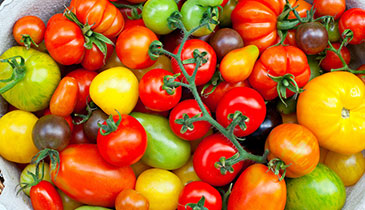 What you eat can play a surprisingly big role in how well you sleep, according to a new study by the Perelman School of Medicine at University of Pennsylvania. The study was the first to link specific nutrients to short or long sleep duration—and also found that people who consume a large variety of foods had the healthiest slumber patterns.
What you eat can play a surprisingly big role in how well you sleep, according to a new study by the Perelman School of Medicine at University of Pennsylvania. The study was the first to link specific nutrients to short or long sleep duration—and also found that people who consume a large variety of foods had the healthiest slumber patterns.
In my lectures and Omni Diet classes, I frequently point out that great health is always about abundance—not deprivation. It’s exciting to see new research highlighting yet another benefit of being an omnivore: catching the optimal amount of Z’s—an average of 7 to 8 hours a night. Skimping on slumber boosts risk for obesity, heart disease, diabetes and other diseases, while excessively sleep also has adverse effects on health.
The researchers divided study participants into four groups: very short sleepers (people who averaged less than 5 hours of slumber a night), short sleepers (5 to 6 hours), standard sleepers (7 to 8 hours) and long sleepers (9 or more hours). The amount of sleep was then correlated to each group’s eating habits. The study and other research suggests that these delicious foods help promote sound, refreshing slumber:
- – Tomatoes. In the study, people with the healthiest sleep patterns ate more lycopene–a bright-red antioxidant found in tomatoes (the richest source), red bell peppers, red carrots and papayas)—compared to the short sleepers. Many studies link high intake of lycopene-rich food to lower risk for cancer, heart disease, and other chronic illnesses.
- – Nuts, seeds and fish. The healthiest sleepers also had a higher intake of selenium, a nutrient found in at particularly high levels in Brazil nuts, sunflower or mustard seeds, cod, tuna, halibut, sardines, shrimp, salmon, and scallops. Selenium boost immune system function, helps protect cells against free radical damage, and aids DNA repair. In addition, research shows that this nutrient enhances male fertility.
- – Broccoli and Brussels sprouts. Two other antioxidants linked to optimal sleep are lutein and zeaxanthin. The best food sources include kale, spinach, Romaine lettuce, peas, zucchini, broccoli and Brussels sprouts. Daily intake of these nutrients protects eye health, by cutting risk for such vision-robbing disorders as cataracts and age-related macular degeneration, the American Optometric Association reports.
- – Oranges, pomegranate and kiwi. Vitamin C also plays a surprisingly big role in healthy slumber, the study found. Fruits and vegetables with the highest amounts include cantaloupe, citrus fruits, mango, papaya, berries, red and green peppers, pomegranates, leafy green veggies, and winter squash. Since cooking reduces vitamin C content, the best source is fresh, raw organic produce.
- – Chicken and shrimp. You’ve probably heard that people get drowsy after a Thanksgiving dinner because turkey is high in tryptophan, an amino acid that helps your body produce serotonin, a brain chemical that influences both sleep cycles and mood. Actually, all animal proteins contain tryptophan and chicken and shrimp are two of the best sources.
- – Chamomile tea. Sip a cup of this fragrant herbal brew and you’ll be out like a light. Research shows that chamomile tea helps you settle down for slumber by easing anxiety and soothing the nerves.
- – Bananas. Sometimes called “a sleeping pill in a peel,” the tasty yellow fruit is a good source of tryptophan and also contains compounds that stimulate production of melatonin, a hormone that influences sleep cycles. Additionally, the magnesium in bananas help your muscles relax.




